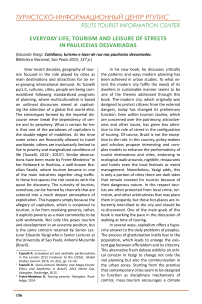Everyday life, tourism and leisure of streets in pauliceias desvariadas Eduardo Y'azigi. Cotidiano, turismo e lazer de rua nas pauliceias desvariadas. Biblioteca nacional, Sao Paulo 2015, 137 p.)
Журнал: Современные проблемы сервиса и туризма @spst
Рубрика: Туристско-информационный центр РГУТИС
Статья в выпуске: 1 т.10, 2016 года.
Бесплатный доступ
Короткий адрес: https://sciup.org/140206451
IDR: 140206451
Текст обзорной статьи Everyday life, tourism and leisure of streets in pauliceias desvariadas Eduardo Y'azigi. Cotidiano, turismo e lazer de rua nas pauliceias desvariadas. Biblioteca nacional, Sao Paulo 2015, 137 p.)
(Eduardo Yázigi. Cotidiano, turismo e lazer de rua nas pauliceias desvariadas .
Biblioteca Nacional, Sao Paulo 2015, 137 p.)
Over recent decades, geography of tourism focused in the role played by cities as main destinations and attractions for an ever-growing international demand. As Tzanelli puts it, cultures, cities, people are being commoditized following standardized programs of planning, where multiculturalism is based on unilineal discourses aimed at captivating the attention of a global first world elite. The stereotypes formed by the Imperial discourse never break the dependency of centre and its periphery. What is certain for her is that one of the paradoxes of capitalism is the double-edged of mobilities. At the time some actors are financially allowed to travel worldwide, others are involuntarily limited to live in poverty and marginalized conditions of life (Tzanelli, 2014 1 ; 20 15 2 ). Similar observations have been made by Freire-Medeiros3 in her fieldwork in Rochina, a well-known Brazilian Favela, where tourism became in one of the main industries together drug-traffic. In these hot-spaces the risk coexists with the quest for discovery. The curiosity of tourists, somehow, can be framed by channels that are ushered into a much deeper atmosphere of exploitation. This happens simply because the allegory of capitalism, which is conjoined to tourism, is far from resolving poverty; rather, it exploits poverty as a main commodity to be sold worldwide. Not only this poses tourism and development in an uncanny position, but is the same concern retained by Senior Lecturer Eduardo Yazigi who is Senior Lecturer at the University of Sao Paulo, Anhemi Murumbi (Brazil).
In his new book, he discusses critically the patterns and ways modern planning has been achieved in urban studies. To what extent the modern city fulfils the needs of its dwellers in sustainable manner seems to be one of the themes addressed through this book. The modern city, which originally was designed to protect citizens from the external dangers, today has changed its preliminary function. Even within tourism studies, which are concerned over the patrimony, attractiveness and other issues, has given less attention to the role of street in the configuration of touring. Of course, Brazil is not the exception to the rule. In this country, policy-makers and scholars propose interesting and complex models to enhance the performativity of tourist destinations and cities, endorsing to ecological walk-arounds, nightlife, restaurants and hotels even the local festivals or event management. Nonetheless, Yazigi adds, this is only a portion of cities there are dark sides that remain covered for tourists because of their dangerous nature. In this respect tourists are often protected from local crime, terrorism, and other arbitrariness that may place them in jeopardy, but these hot-places are inherently inter-liked to the city and should be re-discovered. One of the main goals of this book is marking the pace in the discussion of walking at time of touring.
In several ways, capitalism offers a hypocrite answer to the daily problems of peoples. The process of ghettoization instils fear in the population, which leads to enlarge the existent gap between officialdom and its citizenry. This alternative fresh debate exhibits an ethical concern in Yazigi to change not only the vial planning but also the communication in the urban zones. Starting from the premise that contemporary cities seem to be designed to function as disciplinary mechanisms of control, mass-tourism encourages a climate of indifference and depersonalization in the urban seffings. Look without seeing, hearing without listening are common practices in modern cities that enlarge the gap between visitors and locals.
From Wirth's studies on, sociologists have emphasized on the role of urban geography as a rule-producer in which case, microinteractions are previously conditioned by their relative perception or in terms of Wirth of their being in the place. To resolve some of the great maladies of democracy as corruption of politicians and governments as well as the inefficiencies of burocrats to make of the city a better space, we need to reconsider the current style of urbanism. More fluid streets ensure betters channel of communication among citizens who dwell on the city. Policy makers should prioritize the well-being of peoples instead of the profits of investors.
To cut the long story short, this is a project dotted with a smart argument, written in a polished style how only Eduardo Yazigi may offer us; to put this in bluntly, a recommendable piece, which will last the passing of years, for all those interested in tourism and urban issues.
Reviewed by Maximiliano E. Korstanje
University of Palermo, Argentina Visiting Fellow at CERS, University of Leeds UK


